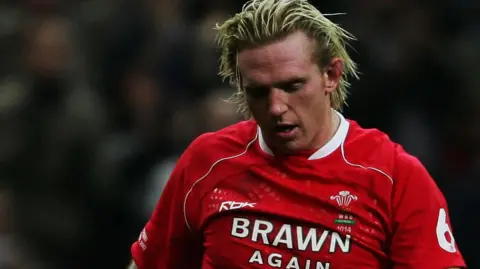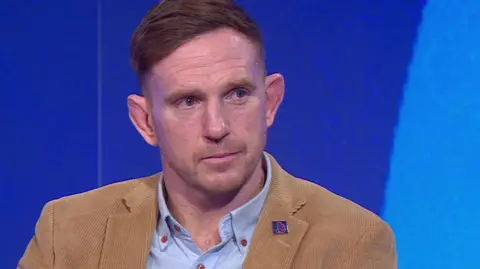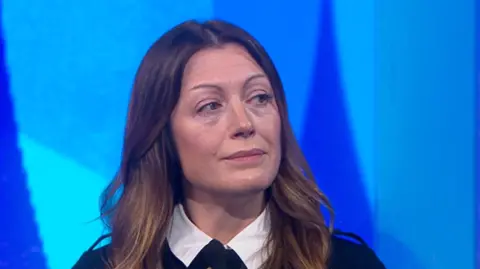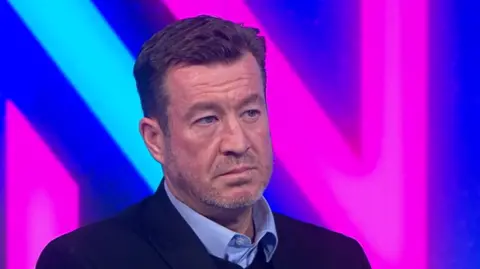Rugby player can't remember career due to dementia
 Getty Images
Getty ImagesFormer rugby union player Alix Popham has said jerseys and medals are the only reminders he has of playing in big matches he has "no recollection of".
The ex-Wales flanker, who had a 14-year professional career, was diagnosed with early onset dementia at the age of 40.
He told Newsnight he believed this diagnosis was due to head injuries he had sustained during his rugby career.
"My neurologist, when he diagnosed me, they worked out I had over 100,000 sub-concussive hits in my brain," he said.
Popham described sub-concussive hits as any contact "when your brain rattles around inside against your skull on every hit", including hits to the body as well as to the head.
He is one of two former rugby professionals diagnosed with early onset dementia who are calling on the sport's governing bodies to end their legal fight with ex-players in the courts.
More than 560 former players are suing the sport's governing bodies for the impact of head collisions during their career.
Popham said that he had jerseys on the wall and medals to show from big games, "but memories, vivid memories of the scoreline, the weather, the stadium, I've got no recollection of that".
He also said he could not recall meeting Nelson Mandela before one game in South Africa in 2003 after suffering a traumatic brain injury and ending up in hospital.
"I've got no recollection of being in that stadium or being in that game and, unfortunately, most of my career is the same," said the former forward.

'Two or three week bans really isn't enough'
Popham is the founder of the Head for Change charity, whose aim is to support those who suffer from sports-related brain injuries.
The Six Nations tournament returns this weekend and a new 20-minute red card punishment is being trialled during the tournament, where a player is removed from the game but the team returns to its full complement once that period is over.
But Dr Willie Stewart, a world-leading expert on brain injury, told Newsnight the new rule "places the spectacle of the game ahead of player's brains".
He said he did not think sending a player off for 20 minutes was sufficient punishment for a potentially dangerous tackle which could cause brain damage.
Popham called for a six-to-eight week punishment for a red card "so you learn and you don't make that same mistake".
"These players are getting two or three week bans which really isn't enough to make them change their habits and, to me, that just shows player welfare isn't their number one priority," he added.

Popham, who played in two World Cups for Wales, told Newsnight his initial symptoms of early onset dementia included "losing my temper over, really, nothing" and being unable to recall "important conversations" with his wife shortly after.
He also suffered from severe headaches and would lose his train of thought in conversations.
Mel Popham said she and her husband had to take the difficult decision not to try for a second baby when he received his diagnosis.
"That was really hard, particularly hard for me, trying to be strong for Al at the time and my stepdaughters and Darcy and the wider family and that was a really difficult personal decision," said Mel.
'It was really frightening'
Reflecting on Popham's diagnosis, Mel said: "We had everything going for us. We'd recently got married, had Darcy, living in a house we loved and our world was just changing.
"It was really frightening."
The couple said they wanted action rather than "empty words" when it came to player welfare.
Reflecting on the impact of injuries sustained during his career, Popham said: "I wish I knew then what I know now because when you were seeing stars you wouldn't carry on.
"You would take yourself off. You would be honest to the coaches, the physios."
Former Wales rugby international Ian Buckett died with dementia last year at the age of 56.
He was found to have had a condition called chronic traumatic encephalopathy (CTE) which is linked with repeated blows to the head but can only be diagnosed after death.
Researchers from a number of academic institutions includes Oxford Brookes University said they had found "conclusive evidence" that repetitive head impacts cause CTE.

Former England youth international Chris Simpson-Daniel was diagnosed with early onset dementia at the age of 43 in 2022.
Simpson-Daniel told Newsnight he had attempted to take his own life on two occasions.
The dad-of-six said he "started falling apart", with bouts of depression and memory loss and "suicidal tendencies that would just whack you out of nowhere".
'Player welfare is our number one priority'
World Rugby told the BBC that player welfare was their number one priority, with the 20-minute red card punishment being implemented as a trial.
It asked anyone with concerns to send them evidence as to why they believe it is not safe.
A World Rugby spokesperson said that if the trial were proven to have negative player welfare consequences then they would have no hesitation in halting it and they had done so with other trials in the past.
In a joint statement regarding the legal action, World Rugby, the RFU and WRU said: "Whilst ongoing legal actions prevents us from engaging directly, we are always saddened to hear Alix, Mel and Chris's stories.
"Player welfare has long been World Rugby's number one priority."
It added its medical protocols had always followed scientific consensus.
"We are always continuing to evolve and adapt the game, to make it as safe to play as possible," it added.
